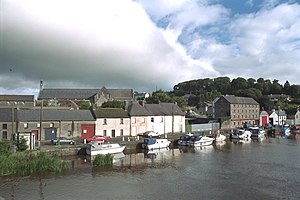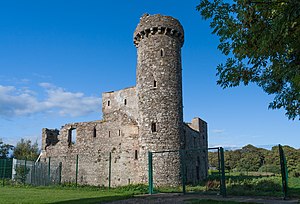Southeast Ireland is a region of Ireland comprising Counties Carlow, Kilkenny, Waterford and Wexford. With a population of 422,062 in 2016, it's one of the eight regions of Ireland for statistical and planning purposes, specifically "IE052 - NUTS Level III"; it's not a unit of local government. Historically most of it was part of the kingdom or province of Leinster, but County Waterford lay in Munster. The southeast has historic cities, pastoral landscapes and long sandy beaches.
Counties
edit| County Carlow Noted for its nature, culture, vibrant nightlife and modern amenities, a pleasant place to visit, where history and contemporary life sit side by side. |
| County Kilkenny This has the attractive medieval city of Kilkenny, the great priory ruin of Kells, and small towns along its rivers. |
| County Waterford With the rich heritage of Waterford city, the stately buildings around Lismore, and many beaches and small harbour towns. |
| County Wexford The main beaches in the south of Ireland are here. Tragic history was played out in the streets of Enniscorthy, Gorey and New Ross. |
Cities and towns
edit- 1 Waterford is Ireland's oldest city, founded by the Vikings, and embellished and battled over since. It has the best concentration of visitor attractions and facilities in this region.
- 2 Lismore has an elegant castle, gardens and cathedral, with other mansions and gardens in the nearby countryside.
- 3 Carlow blends history and modern attractions
- 4 Kilkenny has a medieval core, and is second only to Waterford in its concentration of visitor facilities.
- 5 Wexford is an attractive small city near Rosslare ferry port.
- 6 Enniscorthy was the centre of the 1798 rebellion, and the tiny nearby village of Ferns has a cluster of medieval ruins.
- 7 New Ross is near the JFK arboretum and Kennedy family homestead.
Other destinations
edit- 1 Great Saltee Island is a self-proclaimed independent principality off the Wexford coast, reached by boat trips from Kilmore Quay. The Wexford rebel enclave lasted six weeks, the Kilkenny Confederacy of Ireland lasted six years, but somehow this one has endured since 1945. Either the mainland authorities are short of muskets and gumption, or the taxes that the "Prince" says he won't pay aren't really that much in arrears.
Understand
edit
Glaciers created Ireland's notorious bogs but cleared early from the southeast, leaving a low-lying, well-drained and fertile region. Its two coasts are lined with little coves and sandy beaches where sailing boats could easily draw up, so it attracted many early settlers. No-one knows how the Celts first reached Ireland circa 500 BC, but via the southeast seems likely. The Vikings founded the city of Waterford; the Normans first landed in Wexford and decided to stay for keeps. Here in Tudor times the English resumed the land grab, so Sir Walter Raleigh became a wealthy landowner around Lismore. Castles, abbeys and mansion houses reaped the profits of the farmland. The southeast was also the seat of two major rebellions: by the 17th century Kilkenny Confederacy against Cromwell, and by the United Irishmen in Wexford in 1798.
This means that the region lacks spectacular scenery, but it more than compensates with its rich historic heritage, wealth of visitor facilities, and good transport. And it's somehow homage to the early voyagers and spirit of Sir Walter that the southeast saw the first-ever Ryanair flight, from Waterford to Gatwick in 1985. Equally true to that spirit, it was among the first routes to be axed.
Get in
editDublin Airport (DUB IATA) is usually the best place to fly into, for its range of flights at competitive prices. It's obviously some distance from the southeast but has good direct public transport, and if you hire a car you're soon on the motorway south.
Cork airport (ORK IATA) is closer but has fewer flights. Waterford airport lost its commercial flights in 2016.

Trains run 5-7 times a day from Dublin Heuston to Waterford, taking 2 hr 15 min via Newbridge, Kildare, Athy, Carlow, Bagenalstown / Muine Bheag, Kilkenny and Thomastown. Dublin Heuston is also the station for Cork, Kerry, Limerick, Galway and Mayo. Waterford has a branchline service twice a day to Carrick-on-Suir, Clonmel, Cahir, Tipperary and Limerick Junction, for trains to Cork, Kerry and Limerick.
Trains run five times a day from Dublin Connolly to Rosslare town and Europort, for ferries from Wales and the continent. They take 3 hours via Dún Laoghaire, Bray, Wicklow Town, Rathdrum, Arklow, Gorey, Enniscorthy and Wexford. Dublin Connolly is also the station for Belfast, Sligo and Dublin DART trains. The railway between Wexford and Waterford was axed in 2010 so there is no link between the two main lines.
Buses run direct from Dublin airport and city to Wexford, Kilkenny, Carlow, Waterford and Cork. Bus Éireann is the main operator but they have competition on these routes. Their Bus 40 trundles the breadth of Ireland from Rosslare via Wexford, New Ross, Waterford, Cork, Killarney and Tralee, while Bus 73 runs from Athlone across the midlands to Waterford.
Motorways fan out from Dublin and are toll-free once you leave the city M50.
By boat, Rosslare has ferries from Wales, and in summer direct from Europe. You could also take the ferry from Liverpool or Holyhead to Dublin and drive south. Cork has no ferries but is often visited by cruise ships.
Get around
edit
See above for inter-city rail and bus routes: any two points on the same transport corridor will have good connections, but then there's a lot in between. Thomastown is a good example, with trains and buses rushing between Dublin and Waterford. But the town's main attraction Jerpoint Abbey is 3 km away along a busy road with no public transport or pavement, so you need at least a bike. That might also get you as far as charming Inistioge, but then the distances become daunting so you need a car.
The navigable River Barrow flows through the southeast, but is tidal up beyond New Ross, off limits to rented boats.
See
edit
- Many of the top sights are Heritage Ireland Sites. A heritage card valid for a year costs €21 for an adult.
- Castles: lots, with good examples at Kilkenny, Dungarvan, Lismore, Wexford and Ferns. The strangest miscellany is in County Carlow, with a psychiatrically disturbed one in Carlow town, a plush one near Tullow that reckons to assist the Goddess Isis, a figment of mi'lord's imagination in Bagenalstown, and some that nobody can find; plus many battered stumps.
- City walls are preserved here and there in Kilkenny and Waterford.
- Museums abound. History focused on this region is the Confederacy (against Cromwell) in Kilkenny, and the 1798 United Irishmen rebellion in County Wexford.
- Abbeys and churches include St Mary's Church at Gowran, Jerpoint Abbey in Thomastown, and Tintern in New Ross.
- Gardens include Altamont in County Carlow, the Japanese Garden in Tramore and the JFK Arboretum at New Ross.
Do
edit- Beaches: best for family bathing are on the sheltered east coast of County Wexford. Lots more south-facing, but more exposed, and their sand bars were notorious for wrecking ships. Outside Tramore to warn of its treacherous bay is joint-winner of The World's Campest Lighthouse, built as a flouncy Georgian sailor lad. The title is shared with his twin brother at Rosses Point near Sligo.
- Canal boats: the region is traversed by the Barrow Navigation. It branches off the Grand Canal (navigable from the Liffey in Dublin to the Shannon near Longford) at Robertstown in County Kildare. It courses south to Athy, Carlow, Bagenalstown, Graignamanagh and St Mullins, then becomes tidal down to New Ross, Waterford and out to sea. The river is also navigable up to Kilkenny.
- Gaelic games: the four county GAA teams play home games in their county towns. Kilkenny is a good place to watch hurling as it's their dominant sport, whereas it's Gaelic football in the rest of Ireland.
- Mountains in this region are for soggy hikes not technical stuff, such as the Knockmealdown range between Waterford and Tipperary, reaching 794 m.
Eat
edit
- Waterford has the best selection of restaurants in the region, including Japanese and upmarket French.
- Wexford also has a wide selection, but that county's top dining is probably The Duck in Gorey.
- In Kilkenny the best reviews are for Rinuccini and Zuni in town, and for Mount Juliet golf resort near Thomastown.
- Carlow town has nothing special, but it's worth venturing out to the country house hotels beyond Tullow.
- The blaa is a Waterford specialty - a soft bap. They don't keep, so you must eat them fresh, which is why they're only found in and around the city, and becoming uncommon even there. Snaffle them down while you can.
Drink
edit- Lots of pubs everywhere, but Kilkenny has the most unusual: Kyteler's was home to one of the first people in Europe to be persecuted as a witch, Cleere's contains a theatre, and Left Bank was stunningly redecorated after the bank left.
- There are breweries in Carlow, Bagenalstown, Wexford, Gorey, Waterford and Dungarvan, but Kilkenny Beer and Smithwick's are nowadays brewed in Dublin.
- Distilleries are in Carlow, Enniscorthy, Waterford and Lismore.
Stay safe
editThe region is lowland; take care on the water but the main hazards are man-made, especially traffic.
Go next
edit- West is County Cork and the rugged Atlantic coast through Kerry.
- Northwest lie the midlands, bisected by the Shannon, with Athlone and Clonmacnoise in the middle.
- North rise the Wicklow mountains, with plush mansions at their foot then the outskirts of Dublin.

